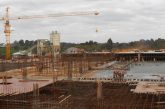
Kenya plans to modernize its aviation facilities to improve passenger-handling capacity to nine million. Transport and Infrastructure Cabinet Secretary James Macharia made the announcement.
The government will also expand railway transport to increase the railway capacity to 50% of the cargo freight from the port of Mombasa and promote commuter rail services. Macharia, whose docket also includes housing, urban development and public works, further said that shipping and maritime facilities will be improved to facilitate the trans-shipment of cargo.
The Cabinet Secretary was addressing a ceremony to mark this year’s edition of the World Engineering Day held at the University of Nairobi. Praising the role of local engineers, Macharia said they will be instrumental in the realization of the Big Four Agenda and Vision 2030 economic blueprints.
Economic growth
“There is a need to design technologies and systems that can facilitate economic growth, education, enhance quality of life, help minimize poverty, ensure adequate food supply and reduction of the carbon footprint,” said Macharia.
Other major projects in the pipeline include the construction and rehabilitation of 10,000 km of roads, comprising 2,500 km of conventional roads and 7,500 km of low volume sealed roads. This is in addition to maintenance of 161,456 km of roads, consisting of about 40,000 km of national trunk roads and 121,456 km of county roads.
Moreover, the government plans to decongest cities and urban areas to ease congestion, reduce travel time and costs, and enhance connectivity in cities and urban areas. Plans are underway to develop a 50-Year Transport Master Plan and a 20-Year Roads Master Plan.

Decline in interest and enrolment of young people
The Cabinet Secretary decried “the decline in interest and enrolment of young people in engineering disciplines such as Agriculture & Biosystems.” The ministry, he said, will create an enabling framework that appreciates the importance of building engineering capacities and promoting engineering education at all levels.
The celebrations were organized by the Institution of Engineers of Kenya (IEK) in collaboration with the Engineers Board of Kenya (EBK). In 2019, UNESCO set aside March 4 as the day to celebrate engineers across the world, with the first such ceremony held last year.
At the event, the Cabinet Secretary launched the inaugural issue of the Engineering in Kenya (EIK) magazine, which is published by IEK, the professional association of engineers in Kenya. The editorial board is chaired by Prof Larry Gumbe.
Speeches read at this year’s event included from the President of the World Federation of Engineering Organizations (WFEO), Prof Gong Ke, and the President of the Federation of African Engineering Organizations, Eng Carllen Bou. The President of the East African Federation of Engineering Organizations, Eng Collins Juma, was present at the occasion and addressed the gathering.
Keynote addresses were delivered by the President of the Institution of Engineers of Kenya, Eng Nathaniel Matalanga, and the Institution’s First Vice President Eng Lucy Mutinda, among others. The Chairman of the Engineers Board of Kenya, Eng Erastus Mwongera, also addressed the gathering, which was moderated by Eng Margaret Ogai.
The theme of this year’s event is “Engineering for a Healthy Planet: Celebrating the UNESCO Engineering Report.” In 2010, UNESCO in partnership with the World Federation of Engineering Organizations (WFEO), the International Council of Academies of Engineering and Technological Sciences (CAETS), and the International Federation of Consulting Engineers (FIDIC), produced the world’s first comprehensive study on engineering. The UNESCO report was entitled, “Engineering: Issues, Challenges and Opportunities for Development.”
The report highlights the importance of engineers to the socio-economic development of humankind. As stated in the publication, “Engineering drives social, economic and human development and underpins our knowledge societies and infrastructures. It is a major factor in innovation and indeed the rise and fall of civilizations” (UNESCO Report, 2010, back cover).
About EBK
The Engineers Board of Kenya (EBK) is a statutory body established Section 3(1) of the Engineers Act 2011. The EBK is responsible for the registration of engineers and engineering firms, regulation of engineering professional services, setting of standards, development and the development of the general practice of engineering. The Board is committed to providing its stakeholders with high quality services in developing and regulating the engineering practice for a safe, efficient and effective engineering infrastructure systems and processes for Kenya.
About IEK
The Institution of Engineers of Kenya (IEK) is the learned society of the engineering profession in Kenya. Its mission is to promote, encourage, and improve the application of Engineering, and other related practices. IEK has over 9,000 members drawn from engineers working in various government institutions (both national and county), consultancies, contractors, educators, designers, and manufacturers. One of the goals of the Institution is to disseminate knowledge and skills by holding talks where current and pertinent issues in all branches of engineering are discussed.





